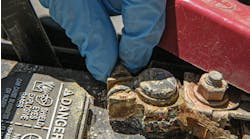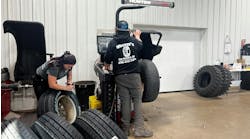You finally get sick of working for someone else and decide to hang your own shingle as a tire dealership. The idea of forgoing a guaranteed paycheck and earning every single cent as an entrepreneur is daunting. Most people don’t have the courage or fortitude to even try. But you’ve made the move and are ready to go. Here is a step-by-step guide for putting your dealership on the path to success.
You’ve signed the lease, purchased equipment and hired employees. Now you’re ready for customers. Everything is about growing your customer base. Heavy advertising, customer-friendly pricing, local grassroots events, community involvement and taking on every and any job will be the keys to your success. At this point, it’s of critical importance to get your car count into the teens. At about 13 cars a day, you can expect to generate about $100,000 in sales and break even, but still get paid a modest salary. Sure, the process can be a little sloppy and mistakes will be made as you are making decisions by the seat of your pants. You are just starting to form what your business stands for. It’s a crazy time, but everyone involved likely has that sense of “do or die” and is committed to making the best of what is presented each and every day.
Now you need to increase your car count. It’s not OK to just break even. Getting car count up to about 20 vehicles a day is a must. This probably requires hiring additional staff. Understand, this staff was not present during the formative months of your dealership and will not have the same sense of urgency and dedication as the initial core ring of fighters. That’s OK and you need to understand that as your business grows, so does that separation from the core circle.
What’s next? Tightening up the processes. While stage one was mostly instinct, stage two needs rules. Establishing opening and closing procedures, writing them down, and even having check sheets is a great idea. Customer greeting standards, as well as ticket life cycle — who writes it up, who asks for inspections, what kind of inspection is done, estimating tickets, advising rules and check out procedures — all need to be carefully documented and explained to employees. As a matter of fact, make sure to include employees in developing these rules. The more they are involved, the more likely they will be to adhere to them.
At this point, your dealership should be generating a modest amount of money. Cash flow is still tight, but your business should be recording net profit with 20 cars a day. You need to be careful with buying the right amount of inventory and managing payroll expenses so you don’t have to borrow money to keep the business running. This is typically where a lot of businesses falter since the owner is generally good at selling tires or fixing cars — or both — but doesn’t have a lot of business savvy. This is a good stage to get into a reputable 20 Group or mentorship.
At this point, you should be focused on building a team that functions efficiently and at a decent emotional intelligence level. Emotional intelligence is a fancy way of saying “no drama.”
That woodpecker you’ve been holding onto because “he’s good at fixing cars” or “he can sell his butt off” should now be on the chopping block.
Trust me. He or she needs to go at this stage. This employee is actually hurting your business.
If you let this employee stick around, your good employees — those who work efficiently and generally get along with others — will start to seek employment elsewhere. Good employees don’t tolerate poor working conditions. If you don’t release the bad employees and upgrade, you’ll be left with a shop full of woodpeckers and now you’ll want to quit.
After you’ve hit this level, your job is to protect the assets of your company: your employees and your stuff — including inventory and equipment. You should have a process in place which allows you to comfortably rely on employees making very few mistakes, so you won’t be anchored to the sales counter or toolbox. Sure, you’ll occasionally be doing the work of employees in situations like vacations or sick days, but it shouldn’t be a daily thing. While focusing on employee retention, you should be making sure your equipment is functioning correctly, the lighting in your shop is sufficient, your pay is fair and in line with the rest of the industry and your employees have the tools and abilities at the ready to do the job right.
Now it’s time to look for a second shop to open, but that’s a column for another day.




